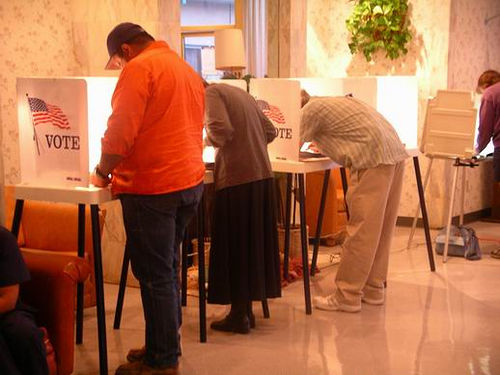
With Election Day coming very soon, it’s important to keep in mind all the items on your ballot that you’ll be able to weigh in on. States ballot measures—sometimes known as referenda, propositions or amendments—are issues of importance that are left to voters to decide. Marriage equality, the death penalty and taxes are issues that have been decided at the state level by voters themselves. Below is a guide to some issues related to economic justice that are on ballots across the country. There are other ballot measures, which you can find here, that you should research before casting your vote. Being informed about these public policy issues is both an important aspect of democracy in the United States and an important value to the Jewish tradition. We are taught “Do not separate yourself from the community” (Pirkei Avot 2:5). From this we learn the importance of engagement with the communities of which we are a part.
Arizona, Colorado, Maine, South Dakota, and Washington will all vote on ballot measures to change the minimum wage within the state:
- In Arizona, voters will decide on whether to increase the state minimum wage from $8.05 per hour to $10 in 2017, and then incrementally to $12 by 2020. The Arizona proposition would also give 40 hours per year of paid sick time to employees who work at institutions with 15 or more employees and 24 hours to those of businesses with less than 15 employees. Employees would be entitled to accrue one hour of paid sick time for every 30 hours worked.
- In Colorado, the ballot will ask voters if they want to increase the minimum wage from $8.31 to $9.30 per hour in 2017 and then increase it 90 cents each year until the wage reaches $12.00 in 2020.
- Maine residents will determine whether to gradually increase the state's minimum wage to $12 by 2020, and after 2020 adjusting it with fluctuations in the consumer price index.
- Washington state voters will cast ballots on the question of incrementally raising the state's minimum wage from $9.47 to $13.50 by 2020.
- South Dakota will decide on whether to lower its minimum wage for workers under age 18 from $8.50 to $7.50.
The Reform Movement is committed to fighting for economic justice, and raising the minimum wage is one of the most effective ways to achieve that objective. Research from the Economic Policy Institute indicates that raising the minimum wage would lift millions out of poverty and spur economic growth throughout the economy. You can use EPI’s budget calculator to find out w the cost of living in your city, and the difficulty of making ends meet on the minimum wage. Also, you can urge your Members of Congress to cosponsor the Raise the Wage Act (S.1150/H.R. 2150), which would raise the federal minimum wage to $12.00 by 2020. In addition, municipalities—counties, cities, and towns—around the country have and will continue to vote on minimum wage increases.
Paid sick days are also an issue of serious concern to us as Reform Jews. We are taught that "one who withholds an employee's wages is as though he deprived him of his life" (Baba Metzia112a). Workers, businesses, and customers all suffer when employees are forced to come to work despite illness. Take action now and urge your Members of Congress to support the Healthy Families Act (H.R. 932/S. 497), which would set a national standard of paid sick days for workers.
Related Posts

Remarks from Rabbi Eliana Fischel at Jewish Gathering for Abortion Access

Teens from North Carolina Speak About Environmental Justice


